Welcome to the Blog of
Dr. Matthew Lewis
Here, you’ll find news from our office, insights and observations from trusted sources in health, information about innovations in the effort to take back your own good health, testimonials from our clients, resources and recommendations of note, and more. Read a post or two and comment on anything that strikes a chord.

Low-Dose Naltrexone (LDN) and Healthy Immune Function
A leading medical doctor specializing in diseases of the small intestine, stomach, esophagus, and colon, claims a drug formerly used to treat opioid and alcohol dependence, has become an intriguing choice for managing several gastrointestinal disorders.
In a recent article entitled “Low-Dose Naltrexone in Gastroenterology: A Bonafide ‘Wonder Drug,” Dr. Leonard Weinstock, M.D., a St. Louis-based gastroenterologist and researcher, asserts that naltrexone — originally used at a dosage of 200 mg daily to treat opioid users and alcoholics — has been found successful in treating intestinal issues when used at just one-tenth of the full dosage.
In my own private practice and here at PROVOKE Health, we have a long history of using low-dose naltrexone (aka, LDN) to treat immune system dysfunction. In fact, a growing body of evidence suggests that LDN is effective in treating conditions such as inflammatory bowel disease (IBD), Crohn’s disease, ulcerative colitis, and irritable bowel syndrome (IBS). It has even shown beneficial implications in several other areas, such as restless legs syndrome (RLS), psoriasis, weight management, and Long COVID, which is characterized by symptoms lasting at least three months after an initial infection.
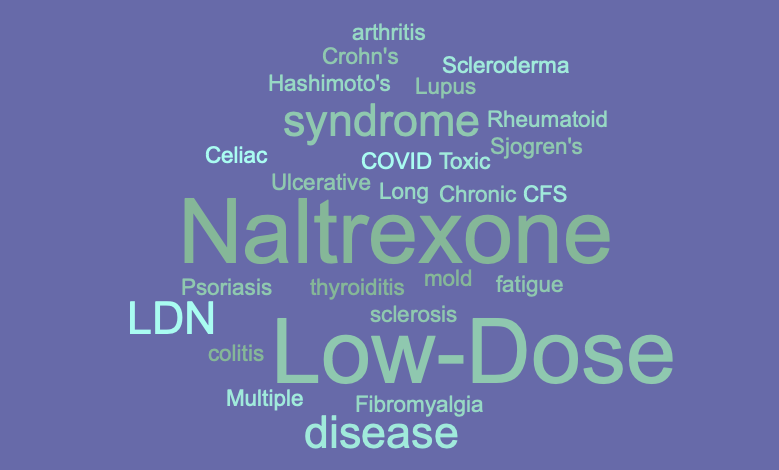
So what is naltrexone and what do we here at PROVOKE Health think about the potential role of this medication in the battle to overcome chronic illness? Well, that depends. As a functional medicine and integrative healthcare practice committed to motivating patients by providing the healthcare, guidance, and support they need, we believe in providing personalized treatment that addresses the unique health and fitness needs of each patient. We do not promote any single treatment or protocol as a miracle cure or a one-size-fits-all solution.
However, in the context of our clinical practice, we have found naltrexone to be an effective tool in the treatment of a wide range of immune system dysfunctions, such as the following:
- Long COVID
- Psoriasis
- Toxic mold
- Fibromyalgia
- Chronic fatigue syndrome (CFS)
- Rheumatoid arthritis
- Crohn’s disease
- Hashimoto’s thyroiditis
- Scleroderma
- Lupus
- Sjogren’s syndrome
- Multiple sclerosis
- Ulcerative colitis
- Celiac disease
In this post, I share how naltrexone can aid in preventing common issues that are associated with the use of opioids — namely relapse — as well as naltrexone potential benefits, at much lower doses, for temporarily restoring healthy immune function. This can be especially useful while the root causes of immune system dysfunction are being identified and addressed.
Naltrexone in the Treatment of Opioid and Alcohol Use Disorders
Classified as an opioid antagonist, naltrexone has been approved for the treatment of opioid and alcohol addiction since 1984. Opioids encompass a range of substances, including the illegal drug heroin, synthetic opioids such as fentanyl, and prescription painkillers such as oxycodone (OxyContin), hydrocodone (Vicodin), codeine, morphine, and others.
These drugs work by binding to opioid receptors in the body, providing pain relief, slowing down breathing,
Candida Yeast Overgrowth: A Root Cause of Many Chronic Illnesses
If you’re experiencing bloating, brain fog, chronic fatigue, and frequent migraines or headaches, it might be wise to ask your doctor to test you for candida yeast overgrowth. Not sure what candida is? Or why it’s a leading suspect in these and other conditions linked to chronic disease? That’s what today’s post is about.
Candida albicans is a microscopic yeast that lives within and around us all. Like many microorganisms, it doesn’t cause a problem until an imbalance occurs in the community of microorganisms (bacteria, viruses, and fungi) that populate the body. Then, it can cause all sorts of illness, from obvious conditions, such as thrush and vaginal yeast infections, to a wide range of illnesses with more mysterious symptoms. These include fatigue, headache, food sensitivities, rashes, and digestive issues. In addition, Candida yeast overgrowth can trigger and contribute to numerous autoimmune disorders, including arthritis, allergies, gastric ulcers, colitis, and Crohn’s disease.
The medical community recognizes and provides treatments for the obvious, acute medical conditions caused by Candida yeast overgrowth, including thrush, vaginitis, frequent urinary tract infections, certain skin and nail infections, and severe systemic infections that affect the blood, heart, brain, eyes, bones, and other parts of the body. But that same community has been slow to recognize the role Candida plays in chronic medical conditions.

In fact, for the last half century and even today, most conventional medical practitioners continue to push back against any suggestion that Candida yeast plays a role in chronic health conditions. They are skilled at identifying conditions that are relatively easy to diagnose and can be treated with pharmaceutical-grade antifungal medications. But they tend to overlook Candida infections that fly below the radar.
Tracing Symptoms to Causes
To be fair, the connection between Candida yeast overgrowth and chronic health conditions can be elusive. Candida overgrowth is typically just one link in a chain reaction of causes. For example, overuse of antibiotics can cause an imbalance in gut flora that triggers an overgrowth of Candida. That can lead to leaky gut that promotes an overactive immune system that attacks the joints, resulting in arthritis. In this complex case, conventional medicine would simply treat the symptoms of arthritis without ever addressing other links in the chain reaction.
In contrast, the functional medicine and integrative healthcare providers here at PROVOKE Health take a different approach. Like curious children, we keep asking questions until we have a complete picture of what’s going on:
Understanding the Role and Benefits of Vasoactive Intestinal Peptide (VIP)
At PROVOKE Health, we prioritize understanding the latest advancements in functional medicine and integrative healthcare in order to provide our patients with the most effective treatments.
One such advancement is the use of Vasoactive Intestinal Peptide (VIP), a peptide hormone made up of 28 amino acids. Found in high concentrations throughout the body — including in the respiratory system, endocrine organs, heart, and brain, , and— VIP plays a crucial role in maintaining overall health.
If you’re unfamiliar with peptides, read “The Healing and Rejuvenating Power of Therapeutic Peptides” here on the PROVOKE Health blog. In short, peptides are short strings of amino acids — much shorter than protein molecules and easier for the body to absorb and break down — that are bioactive and have a beneficial effect on the body.
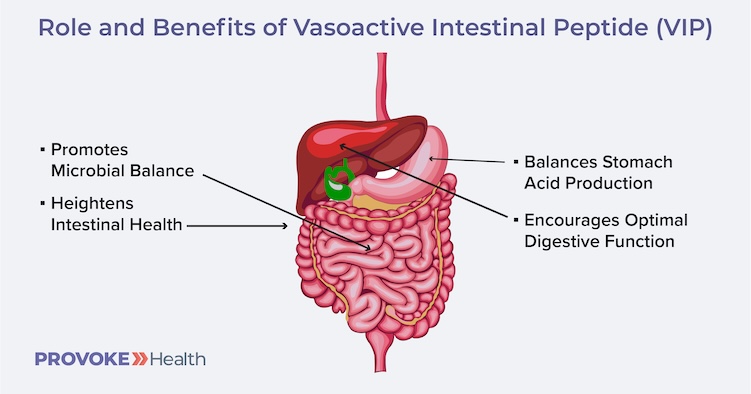
In this post, we’ll focus on the benefits of VIP, starting with its impact on improving gut health.
Vasoactive Intestinal Peptide and Gut Health
Vasoactive intestinal peptide has a significant impact on the health of your gut. Here’s how VIP supports a healthy digestive system:
Understanding the Challenges and Needs of Chronically Ill Workers
A study completed just months ago by Amazon and the Harvard Business Review provides us with some interesting data about working people who are suffering chronic illnesses during the post-Covid age.
Entitled How People Experience Chronic Illness at Work and published in May, the study was conducted by Katie Bach, MBA, MSc, the Director of Science Partnerships and Impact at Amazon, and Gretchen Gavett, a senior editor at Harvard Business Review.
Here at PROVOKE Health, a functional medicine and integrative healthcare practice dedicated to collaborating with patients to rekindle their confidence and improve their resiliency, we create and co-manage personalized plans of care that address or prevent complex health problems, including chronic illnesses. Bach and Gavett’s study is of particular interest because it appears to be the first to explore how recent chronic illnesses such as those discussed below impact workers, and what actions employers can provide to support them better.
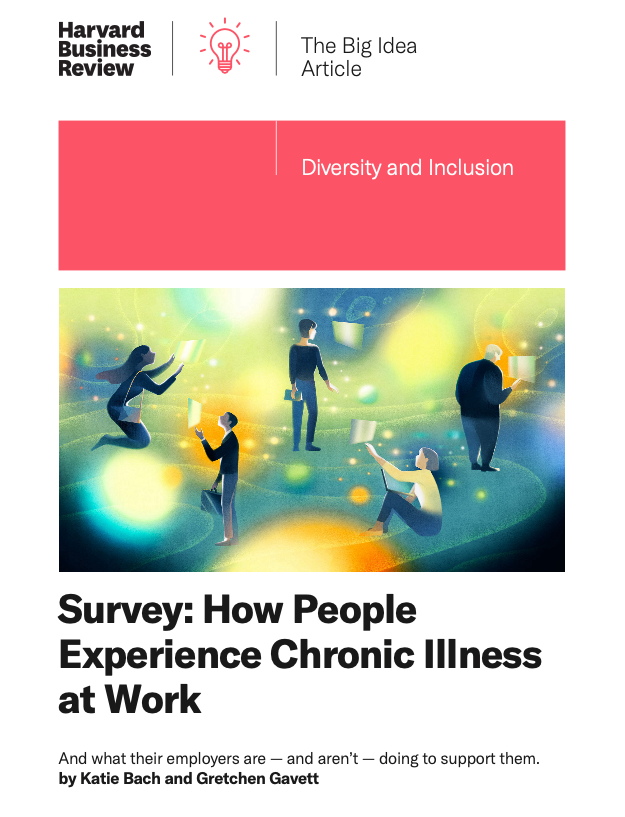 Our patients often tell us about their work-related concerns due to conditions that include long Covid, myalgic encephalomyelitis / chronic fatigue syndrome (ME/CFS), and postural orthostatic tachycardia syndrome (POTS), which are reshaping the workplace landscape in many parts of the country. These conditions, along with mold-related illness and environmentally acquired illness, often lead to fluctuating symptoms and unpredictable energy levels, thus hindering consistent performance at work.
Our patients often tell us about their work-related concerns due to conditions that include long Covid, myalgic encephalomyelitis / chronic fatigue syndrome (ME/CFS), and postural orthostatic tachycardia syndrome (POTS), which are reshaping the workplace landscape in many parts of the country. These conditions, along with mold-related illness and environmentally acquired illness, often lead to fluctuating symptoms and unpredictable energy levels, thus hindering consistent performance at work.
At PROVOKE Health, we understand the complexities of chronic illnesses and are dedicated to diagnosing and treating these conditions in order for our patients to regain their health and resilience. So when a study comes along that offers additional insight into these topics, we’re listening.
What appears to be the impact of chronic illness at work? Here is what the study reveals:
The Impact of Chronic Illness at Work
Experiences Vary Dramatically: The survey reveals a stark contrast between the perspectives of chronically ill workers and their non-ill colleagues. While 60 percent of non-ill respondents believe their organizations are supportive, only 36 percent of those with chronic illnesses agree. This discrepancy highlights a critical gap in understanding and support within workplaces.
Daily Struggles: Chronically ill workers report a range of symptoms that vary daily, making consistent performance challenging. One respondent in the study described the fluctuation as follows:
“Long Covid means that one day I can work at almost full capacity and the next I can barely get out of bed.”
At PROVOKE Health, we specialize in understanding these fluctuations and developing personalized treatment plans to help manage symptoms. And often, we’re able to
Personalized Treatment for Lichen Sclerosus: A Case Study — Part Two
Last week on our blog, one of our patients shared her experience with Lichen Sclerosus and how we have been helping her on her journey to recovery (see “Recovering from Lichen: A Case Study — Part One”).
Janet reported that her symptoms had started 10 years before she visited our Tampa functional medicine clinic, and she was diagnosed three years prior to consulting us. In all that time — despite consulting several doctors — the recommended treatments provided little to no relief.
As part of her intake here at PROVOKE Health, she reported a possible past exposure to mold, so we ordered a mold toxin antibody test, which confirmed the exposure. The positive result led us to understand that mold was aggravating her immune system causing dysregulation and contributing to hormonal imbalances. It’s likely that the problem of Lichen Sclerosus was not solely due to the mold exposure; however, we know it was a contributing factor.
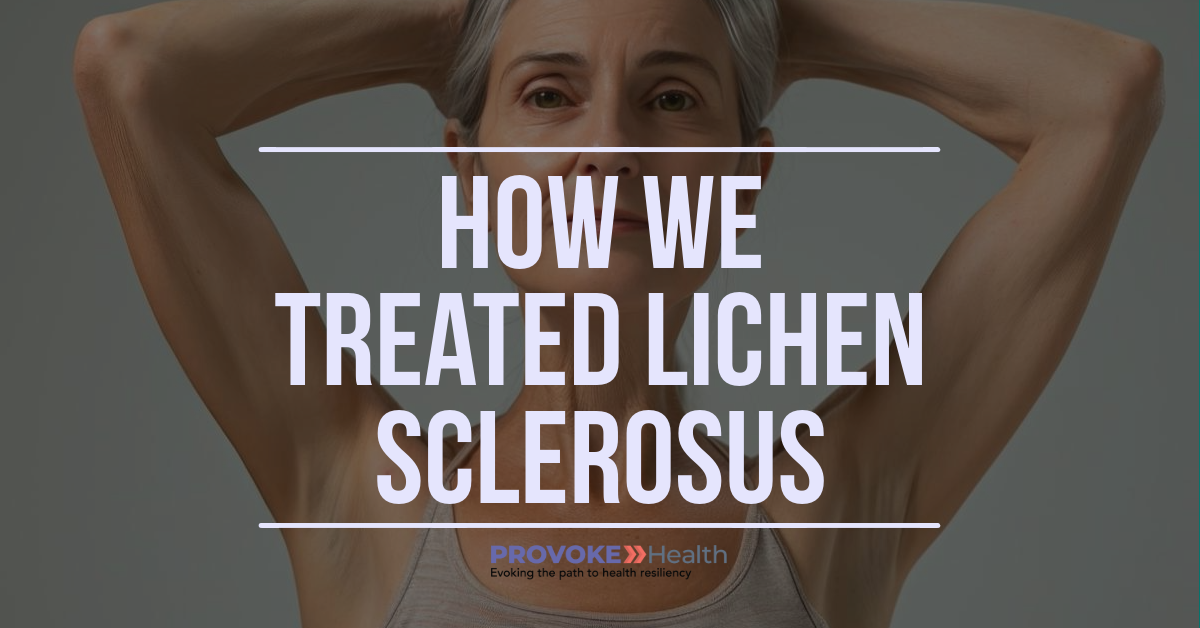
Although Janet reported symptoms of Lichen Sclerosus dating back a decade, upon further discussion, we came to find out that she had suffered from itching for nearly 18 years. This led us to an understanding that mast cells were involved. When mast cells are activated, they secrete histamine along with other inflammatory chemicals called cytokines.
We tested for mast cell activation syndrome (MCAS). She did not test positive for MCAS, but it is a complex illness. Most conditions in conventional medicine are either positive or negative. However, we suspect that MCAS may exist more on a spectrum. Janet could have been experiencing symptoms of MCAS without reaching the threshold of testing positive for it. We find this quite common in our patient population.
This is the nuance of functional medicine. A willingness and readiness to practice in areas that require flexibility and open-mindedness. The question we faced was determining what was continually aggravating those mast cells? In Janet’s case, mold was a contributing factor. For others, it can be a food sensitivity or allergy, another environmental allergy, stress levels, infections, physical exertion, or even a commonly prescribed medication (antibiotic or steroid).
Calming the Mast Cells
Because mast cell reactivity was playing a key role in producing symptoms, we had to calm those cells — make them less reactive. This was a two-step process:
Recovering from Lichen Sclerosus: A Patient Case Study — Part One
Editor’s Note: Today, we’re taking another detour from our usual blog posts that present information from our own medical team and staff. As we did a few weeks ago, we’re presenting a case study that we recently received from a patient who wants to share her personal journey with our healthcare practice, this time for a case of Lichen Sclerosus.
Below, in her own words, is 42-year-old Janet’s experience with Lichen Sclerosus. If you’re not familiar with Lichen Sclerosus, it is a chronic inflammatory skin condition primarily affecting the genital and perianal areas, although it can occur on other parts of the body. Common symptoms include:
- Smooth white patches of skin
- Itching, discomfort, and pain
- Easy bruising or tearing
- Painful sex and painful or difficult urination (if it affects the genital area)
The condition is more common in women, particularly those who are postmenopausal, but it can also affect men and children.
Next week, we’ll be back to our normal format with a blog post featuring our plan of care and some additional thoughts about treating patients living with Lichen Sclerosus.
– – – – – – – – – –
My Journey With Lichen Sclerosus
The most important thing I learned from my journey with Lichen Sclerosus is that the first thing I should have done is visited with someone like Dr. Matthew Lewis at PROKOVE Health.
Prior to seeing Dr. Lewis, I had been dealing with the symptoms of Lichen Sclerosus for more than 10 years. At first, I suffered from itch and irritation, but I didn’t have the classic “white patches.” I consulted multiple doctors, primary care and Ob/Gyn, who diagnosed me as having yeast infections and prescribed repeated courses of fluconazole (an anti-fungal medication). Given the inconvenience of repeat visits to doctors who provide little to no relief, I started using over-the-counter creams, suppositories, and probiotics, none of which was very effective.

Four years ago, the disease progressed to the point where I could no longer tolerate it. My skin began to tear when I had intercourse, and I was dealing with persistent irritation and discomfort. I consulted three more Ob/Gyns and received ineffective treatment recommendations — from changing soap and laundry detergent to using prescription estrogen cream to having surgery. I went to a functional medicine doctor and saw minor improvement after addressing nutritional deficiencies and making dietary changes. However, the discomfort was still consuming my life and causing tension in my marriage.
About three years ago, after conducting my own internet research and bringing it to the attention of my doctors, I finally received a diagnosis of Lichen Sclerosus and was prescribed the standard of care — topical steroids. When my condition continued to worsen, my physician performed a
Personalized Long-COVID Treatment: A Case Study – Part Two
Last week on our blog, one of our patients shared his experience with Long COVID and how we have been helping him on his journey to recovery (see “Recovering from Long COVID: A Case Study.”) His symptoms started after three bouts of Covid-19 in as many years, and even though he was a strong and healthy 63-year-old, the disease had taken a toll on his resiliency — his body’s ability to bounce back after a serious illness.

When we first met him, Doug was physically weak and exhausted and cognitively impaired (both thinking and memory). He had already consulted two other doctors who told him that conventional medicine had no effective treatment protocol for Long COVID and that his symptoms were likely to last for six to 24 months. They recommended that he enroll in a Long-COVID program available through the University of Florida.
We offered a better solution — a personalized plan of care to restore his health, fitness, and resiliency.
In this post, I share additional details about the personalized treatment protocol we prescribed for Doug at PROVOKE Health. But first, we offer a few words of caution.
Not a One-Size-Fits-All Approach
Here at PROVOKE Health, we practice functional medicine and integrative healthcare — a systems-based, whole-body approach that focuses on restoring health instead of merely eliminating illness or suppressing symptoms. That’s why functional medicine is effective in treating health conditions that conventional medicine cannot resolve.
Unfortunately, it is also why what works for one patient may not work for another. Every patient is unique and has special medical needs based on their age, genetics, medical history, family health history, lifestyle, health and fitness objectives, as well as other variants. We do not have a “long-COVID treatment protocol” that we prescribe to all our patients who report symptoms of long COVID. What we offer is a personalized plan of care, which evolves over time as the patient’s health improves.
In this post, I share the personalized plan of care we prescribed for Doug. We caution against using this as a standardized long-COVID treatment protocol or as a way to self-medicate. Prior to treating any patient, we conduct a thorough evaluation, which may include ordering lab tests to determine specifically what the patient needs. Taking too much or too little of a medication or supplement, poor quality products, or the wrong combination of medications and supplements, can do more harm than good. We recommend that you work closely with a certified functional and integrative medical practice in order to obtain personalized, medically supervised treatment.
Doug’s Long-COVID Plan of Care
For Doug, we developed the following
Recovering from Long COVID: A Case Study – Part One
Editor’s Note: Today, we’re taking a slight detour from our usual blog posts that present information and analysis from our own medical team and staff. Instead, we’re presenting case study that we recently received from a patient who wants to share his personal journey with our functional medicine and integrative healthcare practice.
Below, in his own words, is Doug’s experience with Long COVID and PROVOKE Health’s founder Dr. Matt Lewis and our team of healthcare providers, including our Medical Director — Dr. Karalynne Blochberger, MD. Next week, we’ll be back to our normal format with a blog featuring Dr. Lewis’ care of plan for Doug and some additional thoughts about treating patients living with Long COVID.
Here then, is Doug’s story in his own words:
– – – – – – – – – –
I’m a 63-year-old man, 5 feet 11 inches tall, about 190 pounds, a father, physicist, businessman, preacher, and author. I exercise regularly and am generally in good health with no prior major medical issues except for a previous bout with black mold toxicity from 2010 to 2012.

I contracted Covid-19 three times — each about one year apart — in 2021, 2022, and 2023. The first two cases were mild, and I recovered in about a week. The third time, however, the symptoms were more severe. I discovered that I had Covid-19 for the third time on Dec. 20th, 2023. By Jan. 1st, 2024, I thought I was fully recovered. However, two days later I began to experience symptoms that would later be attributed to Long COVID.
My Long COVID Symptoms
Long COVID is a collection of symptoms that last three months or longer after the first symptoms. I experienced the following three severe and debilitating Long COVID symptoms:
Florida is No. 1 in The Nation for Mold — Here’s How to Protect Your Family
Florida leads the nation in a number of things, including being the most favored destination for people who are retiring. It’s also the most popular state for new business formations —outside of Delaware, which is a business formation mill. And the Sunshine State is also No. 1 for something called Education Freedom, which enables students and parents a choice of educational options that best meet their needs.
We could go on and on with these “best in the nation” accolades, but this post deals with what we consider one of Florida’s least laudable attributes: mold. Hands down, Florida is No. 1 in nation in mold.
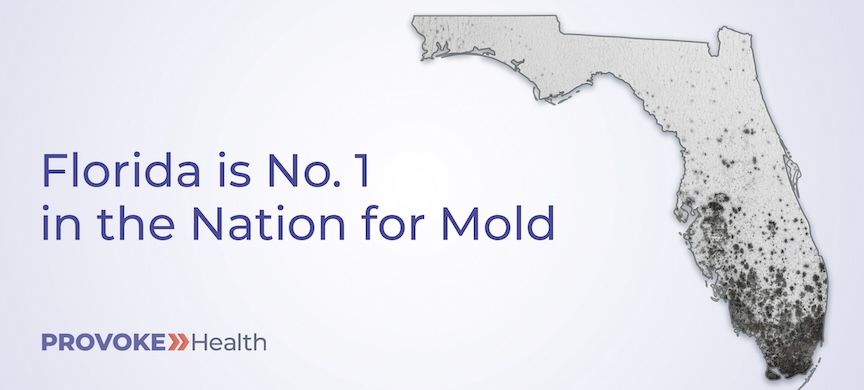
According to a March 2024 study, Florida scored 38.76 out of a possible 40 on the FDP Mold Index. Mississippi ran a close second at 38.66 and Louisiana came in third with 38.52. FDP’s mold index is based on four key metrics that can be attributed to higher chances of mold growing inside and outside the home:
- Average rainfall
- Average temperature
- Average humidity
- Average age of homes
Each metric accounts for 10 of the total 40 points.
These scores are no surprise to our medical team here at PROVOKE Health. Many of our patients live in Tampa and other areas in South Central Florida, and their initial visit to our clinic or via a virtual appointment is often because they’re seeking relief from symptoms commonly related to mold exposure. These patients typically have already consulted with conventional medical practices without receiving much, if any, relief. Some of these medical practices don’t even offer a clear diagnosis.
At PROVOKE Health, we provide relief through a highly personalized protocol that addresses everything from in-home testing and mold remediation to blood draws, detoxing, and treating any mold/fungal infection. We calm the inflammatory response and restore health and function to the body’s nervous system, which is often impacted by mold exposure. And while we don’t test homes or perform mold remediation ourselves, we have a list of trusted companies that do as part of our treatment protocol.
Recognizing the Symptoms of Toxic Mold Exposure
Mold exposure can cause infections, especially sinus infections, as well as overwhelm the body’s natural detox mechanisms. Infections and toxins can cause chronic inflammation, which produce symptoms that are vague and difficult to trace back to a clear underlying cause unless you’re a trained medical professional who knows what to look for. Symptoms of mold exposure include, but are not limited to, the following:
The Power of Peptides in Reducing Brain Inflammation
Marilyn, an otherwise healthy 45-year-old woman, first visited our functional medicine and integrative healthcare clinic complaining of unrelenting fatigue, brain fog, loss of concentration, difficulty recalling words, and restless sleep.
She had seen other doctors, and they were unable to offer a diagnosis or any effective treatments. Her brain MRI scans came back as normal, and the neurologists with whom she consulted found no notable dementia or neurological disease that could explain her symptoms.
Her nervous system and brain were seemingly intact. All good from the perspective of conventional medicine, but Marilyn knew better; clearly, her brain was not functioning optimally. Marilyn’s symptoms were classic signs of brain inflammation. We had seen these same symptoms in hundreds of patients in the past. We knew the causes, and we had effective treatments to help her.
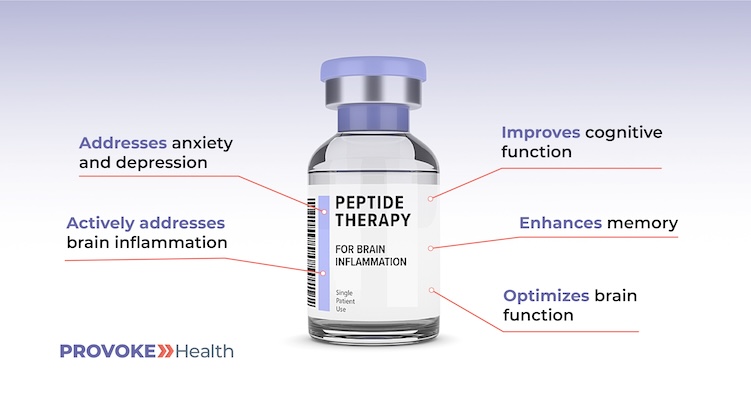
In this post, we look at common causes of brain inflammation and the PROVOKE Health approach to treatment, which may include the use of medically prescribed therapeutic peptides such as:
- Semax
- Selank
- Thymosin Beta 4
Exploring the Causes of Brain Inflammation
In Marilyn’s case many of the common symptoms of brain inflammation were there: exhaustion, clouded thinking and brain fog, poor sleep, anxiety, and a steep decline in quality of life. But before I (Dr. Lewis) go deeper into the specifics of Marilyn’s case, let’s take a look at the bigger picture.
Other Health Conditions Linked to Brain Inflammation
Numerous health conditions can negatively impact brain health and function, including the following:





Recent Comments